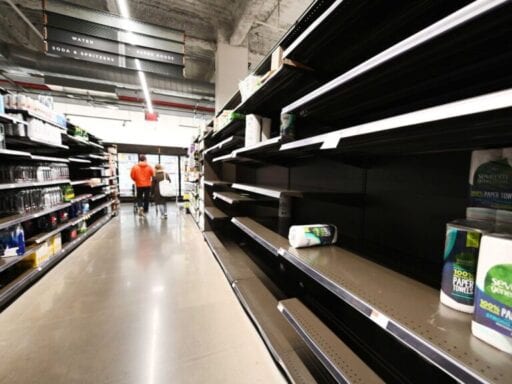The coronavirus pandemic has exposed who can afford social distancing and who cannot.
I never expected to spend so much time thinking about toilet paper. But nowadays, if you looked at my iPhone, you’d find cat photos interspersed with photos of empty toilet paper aisles at stores like Target, Safeway, and Fred Meyer. As a shopper for both Instacart and Shipt, companies that provide grocery and delivery services, I sometimes send customers proof that there really is a shortage in the midst of the coronavirus pandemic. I want customers to feel reassured I’m doing my job.
My work — where I make between $7 and $10 per order before tips — often leaves me feeling a mixed bag of frustration, guilt, and purpose. Most of my customers are grateful for the service, and I feel useful, almost cheerful, when I drop something off at their house (lately, I’m doing more dropping off than handing off items at the door). Stores are busy but not as swamped as they were just a few days ago, and I try to avoid getting too close to people. Social distancing in a crowded soup aisle isn’t ideal, but that combined with constant handwashing and cart-disinfecting seem like my best options for now. It’s only later, when I’m back in my car looking for another order, that I wonder if the best thing I can do instead of working is spending more time self-isolating with my cats.
But here’s the problem: I cannot shop for other people’s groceries from inside my apartment. I cannot make money by staying isolated. I am a freelancer who can’t afford the purest form of social distancing.
A year ago, I was one of the people who could work from home. I got most of my income from sitting at my laptop, ghostwriting articles. But then I started to struggle with feeling burnt out and cooped up. That made me less motivated to seek out additional writing gigs, which meant I made less money, creating a cycle that made me feel more disposable than I already did.
I signed up for Instacart in mid-February, right before it stopped being acceptable to say, “I wanted a job that gets me out of the house.” Shipt came a little later. Shopping and delivering is my main source of my income now, though that could change. As someone who is always revising my plan B, the only constant is my lack of employee-sponsored health insurance.
The coronavirus pandemic has exposed that there are millions of people in America like me: people who don’t have a traditional 40-hour-a-week job, which means we also don’t have benefits or sick leave — which also means we don’t have many choices when a pandemic arises and the bills keep coming in. While I may be in relatively good health now, I’m also gambling that my immune system is more stable than my job situation.
Every day, it seems like more closures of buildings are ordered, more coronavirus cases are being reported, and infectious disease experts are warning us we need to do more to keep our distance. That is when the guilt starts to creep in and I feel pulled between making ends meet and questioning if I’m doing my best for my community.
I know that imposter syndrome during a pandemic is the most self-indulgent kind, but in those low moments, I wonder what special skills I have that I can go out when other people are hunkered down? How am I essential? A friend of mine has a husband who works at a gas station while she stays home with their infant. He cannot oversee the gas pumps from home. If he doesn’t go to work, then they don’t have a home, and you can’t shelter in place without a roof over your head. Another friend’s husband works for the US Postal Service as a mail carrier. Telecommuting isn’t an option there, either.
Maybe my friends are right, that I am helping people self-isolate by delivering groceries to them. One woman told me, “I hate Instacart,” which alarmed me until she added, “because it’s got me spoiled.” The adult kids who are ordering for their parents remind me that I could soon be doing the same thing for my own parents, both of whom just turned 60 last year.
In normal times, I have trouble with vulnerability, with the idea that people will always need help from others. I’m trying to find comfort in that idea now. We need gas and mail and prescriptions and healthy foods to cook at home. Sometimes we also need a king-size Kit Kat or tub of Pringles to get us through the lead segment on the news.
For the moment, I can bring people food and other supplies. I don’t know if I’ll be able to do that tomorrow or next week. Like everyone else, I’m waiting and seeing what happens next. I just happen to be doing it while driving around in a Chevy Malibu filled with insulated cooler bags and disinfectant wipes.
Lareign Ward lives in the Pacific Northwest. She writes about pop culture, home security, and more.
Author: Lareign Ward
Read More



